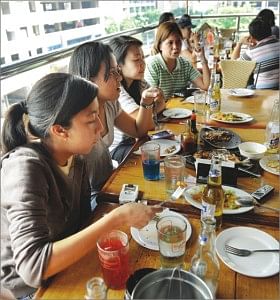Outsourcing reshapes Philippine society

A group of call centre employees relax at a restaurant in the financial district of Manila on July 10. Daybreak is happy hour in a world turned upside down at Dencio's off Ayala Avenue in the Philippines' financial district, the clientele young and loud and with a hint of California accent. Photo: AFP
Daybreak is happy hour in a world turned upside down at a trendy bar in the Philippines' financial district, the clientele young and loud and with a vague California accent.
Vodka cruisers and beer fly by the bucketful as good friends Cici, Pau and Jels go off duty along with the rest of the night shift in the nation's half-million strong business process outsourcing (BPO) workforce.
Even the hors d'oeuvres are edgy -- "drunken" shrimp and green mango soaked in pale pilsen -- reflecting the punishing lifestyles of the partygoers.
"I used to drink eight bottles of Red Horse at a time and still find my way home," said 28-year-old Cici, discussing a local brew known for its high alcohol content and often called "The Devil's Own Juice."
The group of young women really let their hair down on Saturdays, hitting bars, beaches or shopping malls all day so they can socialise with friends outside the industry and sleep at least for one night like a normal person.
Life in many ways is a blast for the young, single and educated in the outsourcing industry.
Entry-level jobs bring salaries of 300 dollars a month with the promise of triple that after a few years' experience -- good wages in a country where a third of the population live on a dollar a day.
Jobs are plentiful and can come with generous perks such as 13th and 14th-month pay, performance bonuses and free medical insurance.
And the outsourcing industry -- which has soaked up millions of call centre, accounting and other back-office jobs from the developed world -- is becoming an increasingly vital part of the nation's economy.
Its 500,000 Filipino employees are the world's second biggest outsourcing workforce behind India.
Its revenues, which already account for 5.0 percent of the country's gross domestic product, are growing at double digit rates annually, according to the industry group Business Processing Association Philippines.
On a more micro-level, entire 24/7 service industries -- including convenience stores, bars and fast-food restaurants -- have sprung up around the new office towers to serve the needs of the booming sector.
However there are concerns about the way the industry is reshaping young adult society, as well as the pressures the workers face as they remotely help customers and clients on the other side of the world.
The odd hours, irate clients, tedious workloads and performance demands often drive staff -- particularly call centre workers -- to early burnout.

 For all latest news, follow The Daily Star's Google News channel.
For all latest news, follow The Daily Star's Google News channel. 



Comments